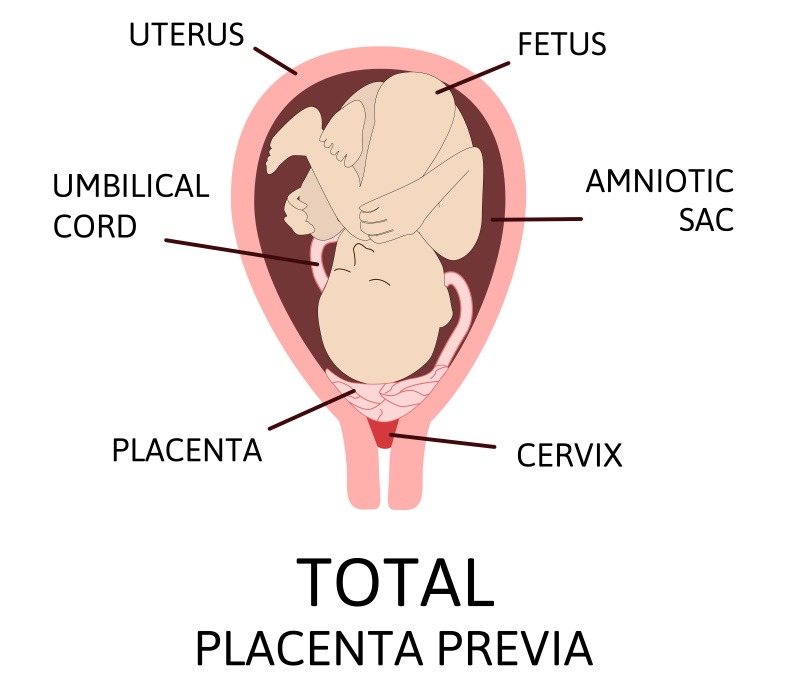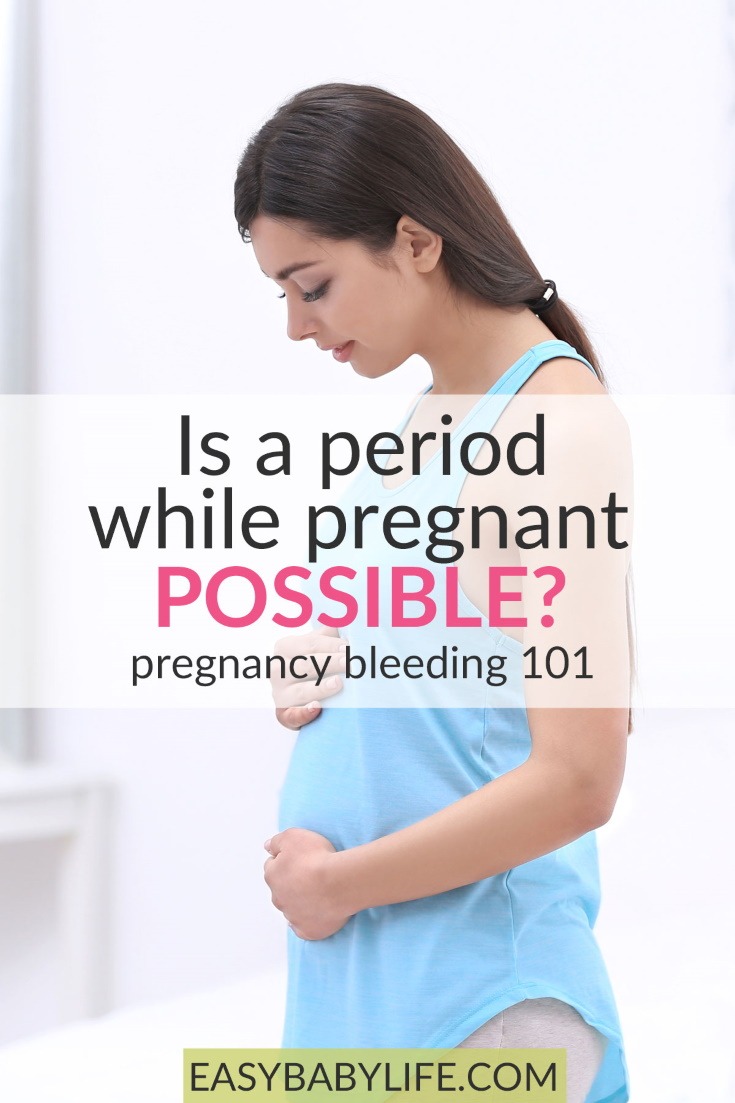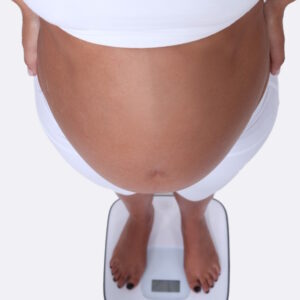Is it possible to have a period while pregnant? What does pregnancy bleeding mean, and how dangerous is it?
Let’s take a look at different reasons and how to act if you experience bleeding during your pregnancy.

The fact that you can’t have your period while pregnant in week 35 or even 22 is something most people would know about and agree on.
But how about when 5 weeks pregnant? Or 8 weeks?
Unless your pregnancy was unintended and unwanted, bleeding in early pregnancy can be quite traumatic. Or at least very disappointing. It is also very easy to start making explanations for yourself why you are bleeding and still pregnant. (Yes, I have been there, done that. Many times.)
There are reasons why you could be bleeding in early pregnancy and still pregnant. In most cases, you’re not. But read about the special cases here and a few reasons for bleeding in late pregnancy.
A Period While Pregnant?! The Real Reasons for Pregnancy Bleeding
In this article…
Shortly Put – No
Although many women think they can have a period while pregnant, this is not going to happen.
When you consider what a menstrual period is, you will realize this is impossible. A menstrual cycle starts when you do not become pregnant and flushes everything from the body that was being prepared in the event a pregnancy did occur.
So while bleeding in early pregnancy is entirely possible, a menstrual period during pregnancy is not.
6 Reasons for Bleeding During Early Pregnancy
If you are bleeding when you are in the first trimester (first three months) of your pregnancy, this is vaginal bleeding or bleeding inside your uterus, not a period while pregnant. It is not rare, although you still should consult your doctor IF your pregnancy has already been confirmed by, for example, a pregnancy test.
Here are some common reasons for bleeding during early pregnancy.
1. Implantation Bleeding
Sometimes, bleeding in early pregnancy occurs only a few days after conception when the egg attaches to the uterus wall. This can be anywhere from 5 to 10 days after conceiving.
The bleeding may seem like an actual period; however, it is not. Instead, it is called an implantation bleeding and is just that; small bleeding as the egg is buried into the uterine wall. So this is a positive spotting that occurs before your period is due.
2. Hormonal Early Pregnancy Bleeding
Some women bleed regularly for the first two or three months after becoming pregnant. Because the bleeding occurs regularly, it is mistaken for a period.
What it actually is caused by is the hormonal changes your body is going through and is often called “early pregnancy bleeding“. This is not uncommon and is one of the reasons women think they have a period.
3. Subchorionic Bleed
Another possible cause of bleeding is that there may sometimes be a blood clot that will appear on the placenta along the outer edge. Called a subchorionic bleed, this is not rare and will normally clear up on its own.
This can cause bleeding that is similar to a period. You should inform your physician so they can keep track of the situation as a precaution.
4. Uterine Wall Bleeding due to Hormones
Yet another reason may be due to the hormones getting a little wacky. They may cause parts of the uterine wall lining. Because it has not totally attached itself to the placenta, parts of it will be shed. Although this sounds serious, it is actually a common occurrence and should not be a concern.
5. Pregnancy Bleeding due to Birth Control Pills
You could continue bleeding for several months if you get pregnant while on birth control pills. This is confusing because you cannot pinpoint the exact date of your last period. The doctor will have to do an ultrasound to determine when the baby is due.
6. Miscarriage
Then, of course, bleeding in early pregnancy can also be what a newly pregnant woman is the most worried about – a miscarriage. To rule it out, or in the worst case, at least have it confirmed, you should see your OB/GYN in case of bleeding after a positive pregnancy test.
3 Reasons for Bleeding During Late Pregnancy
You could bleed during the latter part of your pregnancy for several reasons. Obviously, this late in pregnancy, no menstruation is involved.
Bleeding in late pregnancy can be a lot more serious than early bleeding and should be reported immediately to your physician.
1. Placental abruption
One of the reasons could be a placental abruption. This is when the placenta separates from the uterine wall. This does not occur often but is more prevalent among certain women. It is more apt to happen if you have a history of this.
Placental abruption is a very serious and life-threatening condition for both the mother and child, so call 911 if you start bleeding abundantly.
2. Placenta Previa

Another potentially very serious condition is called placenta previa. This happens when the placenta blocks the cervix. A common symptom of placenta previa is unpainful bleeding, often during the second trimester. It is diagnosed through an ultrasound scan.
The placenta may block the cervix totally, like in the picture above, or partially. This happens in around 1 of 200 pregnancies (source), and if it doesn’t correct itself (which it quite often does), vaginal birth is impossible.
Also, placenta previa can result in mild or severe pregnancy bleeding and must be assessed by a doctor. You might be instructed to bedrest, or at least not to exercise – all to minimize the risk of bleeding and premature birth.
Women who have given birth by cesarean section or have had multiple uterine surgeries are more prone to this condition. Smoking, the use of cocaine, or being older than 35 years also increase the risk.
3. Early Labor
Early labor can cause bleeding as well. This should also be checked out immediately.
You might also want to read up on signs of labor as well as Braxton-Hick contractions, so you’ll know if there are other signs of early labor going on too.
Takeaways
Any time bleeding occurs when you are pregnant; it is best to be on the safe side and inform your doctor. It is definitely not possible to have a period while pregnant, so communicating with your doctor is important! However, in many cases, everything is fine! This is important to remember too!
Late pregnancy bleeding is more of a call for alarm than early pregnancy bleeding. Only he or she will know if it is something to be concerned about or if it is a common occurrence.
I truly hope you will not have to experience the stressful event of unexpected bleeding during pregnancy. If you do, at least make sure to find out why. It doesn’t have to be a worst-case scenario. A lot of times, it is not. :-)
Read Next
- Miscarriage statistics by week
- Premature baby survival by week
- What can cause a miscarriage – and not
Good luck with your pregnancy!

Paula Dennholt founded Easy Baby Life in 2006 and has been a passionate parenting and pregnancy writer since then. Her parenting approach and writing are based on studies in cognitive-behavioral models and therapy for children and her experience as a mother and stepmother. Life as a parent has convinced her of how crucial it is to put relationships before rules. She strongly believes in positive parenting and a science-based approach.
Paula cooperates with a team of pediatricians who assist in reviewing and writing articles.







